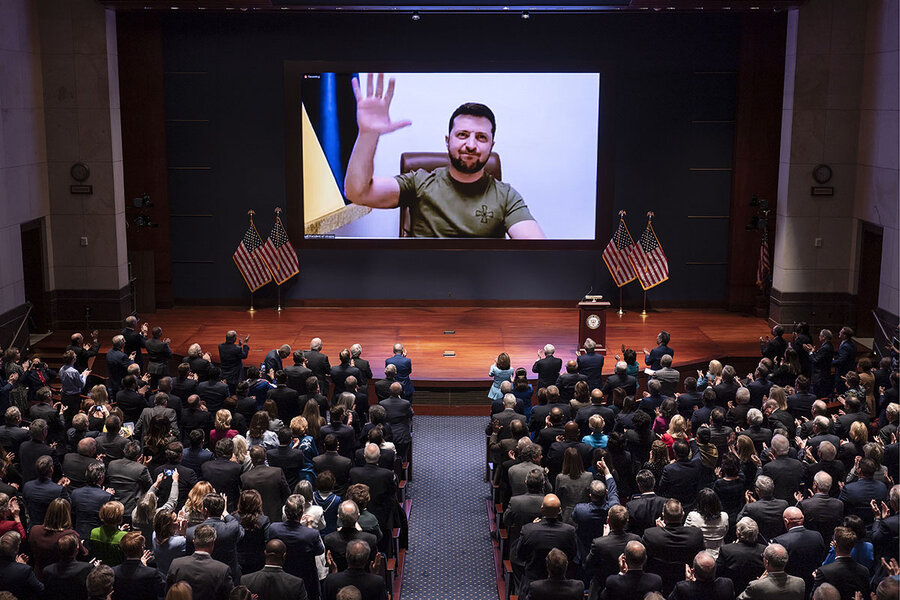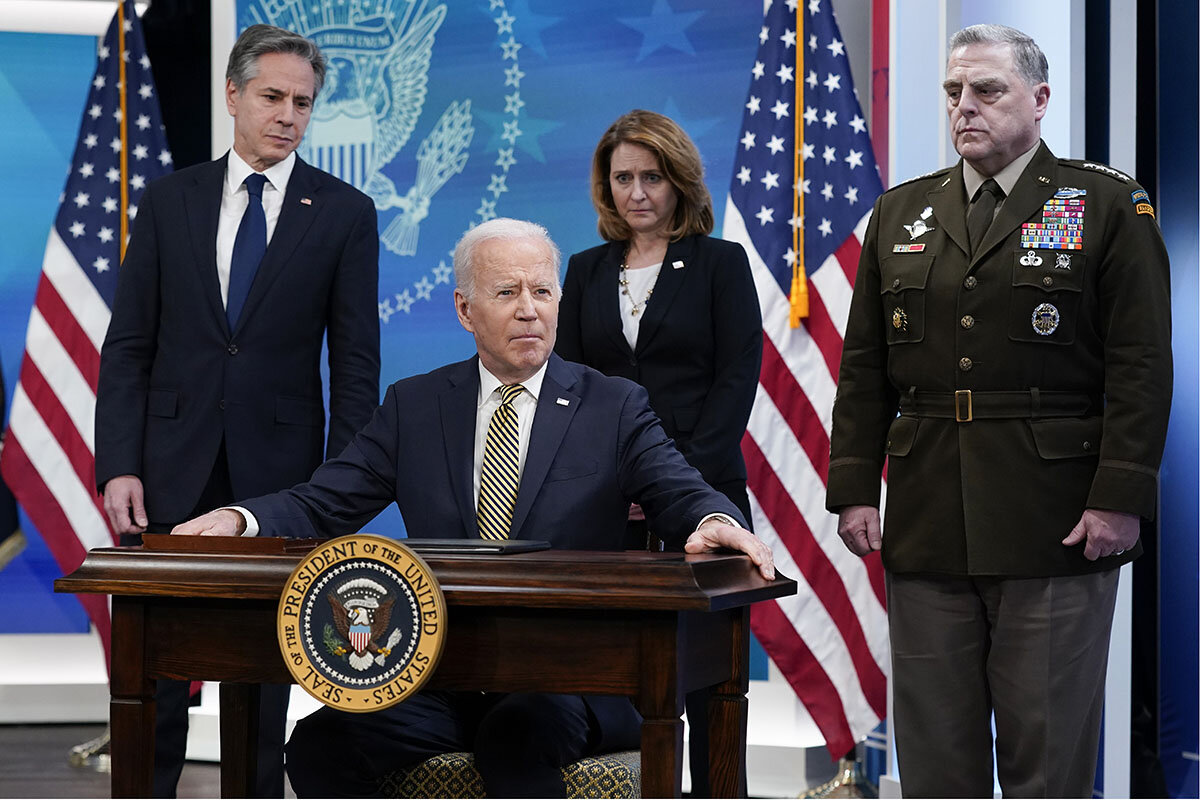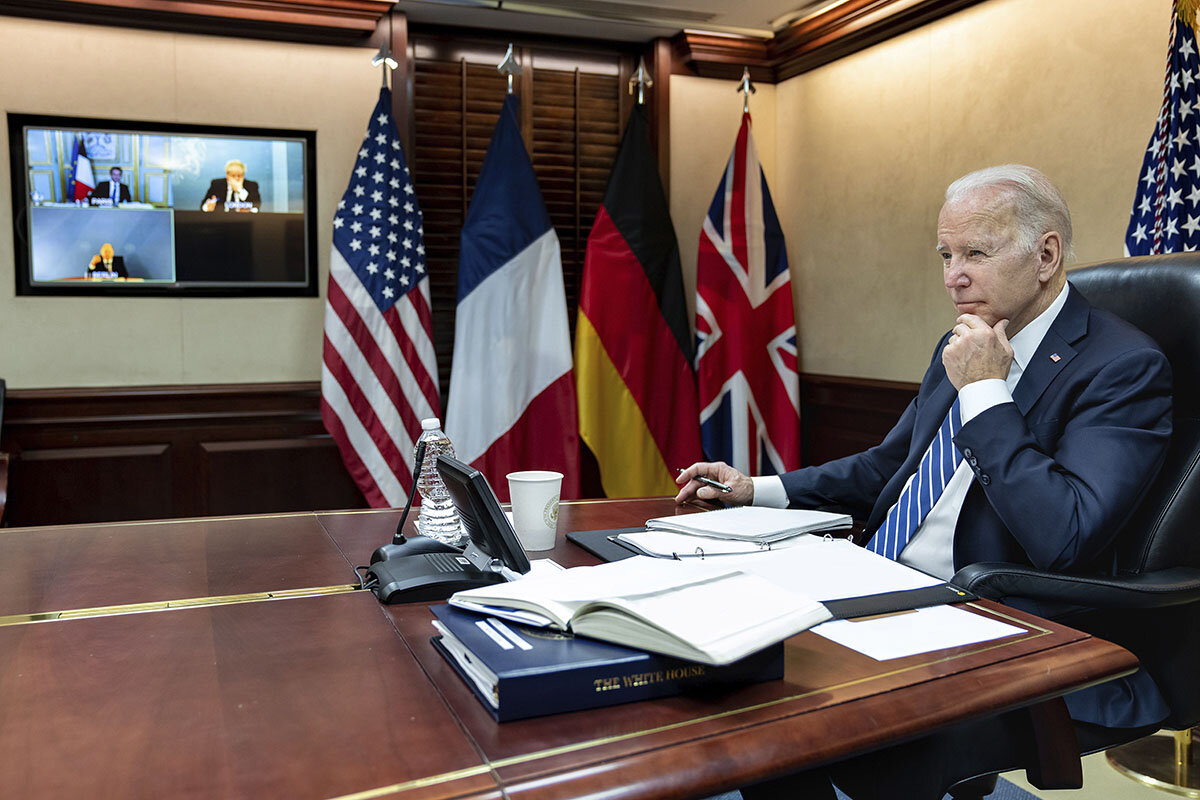Biden’s high-wire act on Ukraine
Loading...
| Washington
Ukrainian President Volodymyr Zelenskyy’s compelling video address before a joint session of Congress on Wednesday drew sustained applause from both sides of the aisle – a reflection of the widespread admiration for his bravery as well as the continuing horror over Russia’s relentless war on his country.
Speaking from the Ukrainian capital of Kyiv, he ended by addressing President Joe Biden directly in English.
“Being the leader of the world means to be the leader of peace,” said Mr. Zelenskyy, wearing his trademark military-green T-shirt.
Why We Wrote This
What should U.S. presidential leadership look like amid the harrowing conflict in Ukraine? Where supporters tout Biden the coalition builder, critics say his response has been weak.
Yet in the short term, the dramatic speech by the comedian-turned-wartime leader is likely to make President Biden’s job only more difficult. The stirring appeal, which invoked both Pearl Harbor and 9/11, put direct pressure on the United States to do more to help Ukraine, despite Mr. Biden's stated concern that certain forms of assistance could lead to a broader war.
It may also widen political rifts at home over the conflict – and over whether Mr. Biden's leadership has been a display of weakness or a master class in de-escalation and behind-the-scenes diplomacy in the face of the most serious threat to the global order in decades.
Soon after Mr. Zelenskyy spoke, Mr. Biden announced that the U.S. would provide another $800 million in defensive weaponry to Ukraine. But he did not relent on Mr. Zelenskyy’s pleas for MiG fighter jets or the establishment of “humanitarian no-fly zones” over his country to allow basic supplies to reach besieged Ukrainians. Mr. Biden aims to avoid direct conflict between NATO and Russian forces, which would be tantamount to “World War III,” he has said.
To that end, national security adviser Jake Sullivan spoke Wednesday to his Russian counterpart, Nikolai Patrushev – the first publicly announced high-level call between U.S. and Russian officials since the Ukraine invasion started Feb. 24. Mr. Sullivan warned Mr. Patrushev against the use of chemical or biological weapons in Ukraine, the White House said.
The domestic U.S. political calculus is also evolving. After early bipartisan support for Mr. Biden’s approach to Ukraine, including praise for sanctions against Russia and agreement that U.S. troops should not be sent into Ukraine, which is not a NATO ally, GOP leaders have lately ramped up criticism.
Republicans accuse Mr. Biden of being slow in helping a nation that has fought to become independent and democratic, after long subjugation by Russia. “American strength is not the provocation. American weakness is,” said Senate Minority Leader Mitch McConnell in a statement. “We need to help get air defense systems to Ukraine without wasting another second.”
In U.S. political terms, “the days of a big ‘rally around the flag’ are past,” says Christopher Gelpi, a political scientist who studies military force and public opinion at Ohio State University. “They could come back again, but right now the public is so polarized.”
Mr. Biden’s approval rating is at 43%, according to the Pew Research Center, up slightly from 41% in January. His approval rating for handling of the Russian invasion is slightly higher, at 47%.
President Biden has long experience in foreign policy, both as a senator of 36 years and in eight years as vice president. Some foreign affairs analysts praise the president for how quickly and effectively he helped pull the Western alliance together to address the crisis.
“The administration really laid the groundwork nicely in the run-up to the invasion, and that’s one of the reasons why they were able to reap the dividend of allies going faster than was imagined after the invasion,” says Hal Brands, professor of global affairs at the Johns Hopkins School of Advanced International Studies.
He adds, “[Russian President Vladimir] Putin is doing our diplomatic work for us so far by offering up a provocation that is so outrageous that it simply can’t be ignored.”
Some experts are also crediting Mr. Biden for not being “showy” in how he's approached the crisis. Mr. Biden has at times ceded the public spotlight to two NATO leaders – French President Emmanuel Macron and the new German chancellor, Olaf Scholz – who took lead roles in trying to resolve the conflict with Moscow before the war started.
To some extent, that makes a virtue out of a Biden weakness: his lack of a forceful public presence. Public speaking is not the president’s strong suit, and he seems to have no problem sharing the burden when it comes to taking on Mr. Putin’s aggression.
Still, experts say Mr. Putin would like nothing more than to portray the standoff as a conflict with the U.S. Mr. Biden hasn’t allowed that to happen. Mr. Zelenskyy, too, has played an outsize public role, choosing not to flee Ukraine and putting out regular videos on social media as he fights for his country’s freedom. That has further set the narrative firmly as Ukraine vs. Russia, not the U.S. vs. Russia.
But that’s not to suggest that the U.S. isn’t a major player in the Ukraine crisis. A lot is happening out of public sight, says Elizabeth Saunders, an expert on the politics of U.S. foreign policy at Georgetown University.
“You don’t observe this kind of unity in alliances unless there’s been a lot of preparatory work behind the scenes,” says Professor Saunders. “In some ways, this is a return to the norm of off-camera coordination with allies.”
Mr. Biden suffered a blow to his reputation on international affairs after the chaotic U.S. withdrawal from Afghanistan last August. Russia’s Ukraine invasion – the biggest assault on a European nation since World War II – is probably the last thing he wanted.
But it has given him the opportunity to demonstrate his chops in a part of the world he knows well – albeit not for wholly positive reasons. Ukraine was central to former President Donald Trump’s first impeachment, over allegations that he pressed Mr. Zelenskyy to provide dirt on Mr. Biden’s son, Hunter Biden, to help Mr. Trump win reelection. The younger Mr. Biden had served on the board of a Ukrainian natural gas company called Burisma.
The contrast with the Trump presidency is sharp. President Trump had hinted at pulling the U.S. out of NATO, the long-standing military alliance among the U.S., Europe, and Canada aimed at deterring Soviet and then Russian aggression, and he had used that cudgel to get NATO members to spend more on defense. Such a pullout would have fulfilled a long-held dream of Mr. Putin to weaken the alliance.
Instead, the 2020 election of the internationalist Mr. Biden ensured NATO’s longevity and allowed the U.S. and its allies to use their collective force to stand up to Russia. Next week, Mr. Biden will travel to Brussels for a special summit of NATO leaders on the Ukraine crisis.
Simultaneously, the European Union – a political and economic union of 27 European states – has also used its collective clout to pressure Russia on the economic front. When the U.S. announced its embargo of Russian oil earlier this month, EU nations also signaled plans to wean themselves from Russian energy, a more significant undertaking.
Further sanctions could be in the offing, if Russian aggression in Ukraine continues. One option is “secondary sanctions,” which target anyone doing business with a sanctioned state like Russia, says Daniel McDowell, an expert on international political economy at Syracuse University.
But Mr. Biden shouldn’t just sanction Russia as heavily as possible, Professor McDowell says. The president may face domestic pressure to respond more forcefully, he says, but the more America acts alone, the harder it becomes to coordinate allies from Germany to Japan. “Keeping the coalition together is really critical, and I think in that respect, they’ve done a really good job.”







